The post Math games have real consequences and rewards at UBC Okanagan appeared first on UBC Okanagan News.
 Gardiner was clearly up for that challenge. In June 2023, she was named the Bachelor of Management Head of Class, an honour presented to the top student based on academic performance throughout their program.
It’s an achievement she credits to the connections made in her studies and across campus.
“In terms of academics, I found the professors here truly care about the success of their students and their approachability enabled me to foster relationships that led to valuable mentorship. By taking advantage of the resources the university offers, I think students can customize their undergraduate degree experience and make what they want to make of it.”
For Gardiner, this meant exploring both the world and her future career.
“Through the Co-op program, I was able to try out different career paths I was interested in. Being able to apply the technical knowledge from my degree in a work environment really enhances the value of a university education.
“I think it helps students realize how to make an impression after graduation.”
Gardiner didn’t stop enhancing her experience there. In her fourth year she pursued an academic exchange at Universidade de Santiago de Compostela, where she fulfilled her dream of studying abroad and improving her proficiency in Spanish.
Gardiner was clearly up for that challenge. In June 2023, she was named the Bachelor of Management Head of Class, an honour presented to the top student based on academic performance throughout their program.
It’s an achievement she credits to the connections made in her studies and across campus.
“In terms of academics, I found the professors here truly care about the success of their students and their approachability enabled me to foster relationships that led to valuable mentorship. By taking advantage of the resources the university offers, I think students can customize their undergraduate degree experience and make what they want to make of it.”
For Gardiner, this meant exploring both the world and her future career.
“Through the Co-op program, I was able to try out different career paths I was interested in. Being able to apply the technical knowledge from my degree in a work environment really enhances the value of a university education.
“I think it helps students realize how to make an impression after graduation.”
Gardiner didn’t stop enhancing her experience there. In her fourth year she pursued an academic exchange at Universidade de Santiago de Compostela, where she fulfilled her dream of studying abroad and improving her proficiency in Spanish.

Aurora Gardiner is pictured at Gavarnie Falls, located in the Pyrenees mountains bordering Spain and France.
Why did you choose to study management, and why is it relevant in today’s society?
Growing up in a business-oriented family always piqued my curiosity about the vast world of business and the myriad of opportunities in the world. I started commerce and business studies in the ninth grade and never looked back.
Business management provides the skills and knowledge necessary to help companies grow in an increasingly interconnected global marketplace. With more and more people starting their own businesses, the demand for individuals with management skills is also growing. These are essential for creating, running and scaling businesses.
You’re the recipient of an International Community Achievement Award. What does it mean to you?
This award recognizes my contributions and achievements within the international community at UBC Okanagan. It signifies that I’ve made a positive impact on the lives of others and have helped foster a sense of belonging and inclusivity for my fellow international students. It’s an honour and a privilege to be recognized for this award, and is a testament to the hard work and dedication I’ve put into my involvement with the international community.
How do you balance school and home life?
I love this question because everyone asks me this all the time. As an international student, I always have five classes. Add to this, two jobs and my work with two student associations. I think balancing school and life is something that comes naturally to everyone in their own way. I have a set to-do list and timetable for everything that has to be done in a week. I also make time for rest (I’ve recently realized how important it is to rest!)
Why is it important to get involved on campus?
Joining clubs and organizations, and taking part in events on campus, allows you to meet new people and build relationships with other students, professors and staff. These connections can be valuable both during university and after graduation. Being involved on campus can help you develop a wide range of skills, like leadership, time management, teamwork and communication. Employers value these skills and can help you stand out in the job market. Being involved on campus can also help you feel more connected to your university and create a greater sense of belonging.
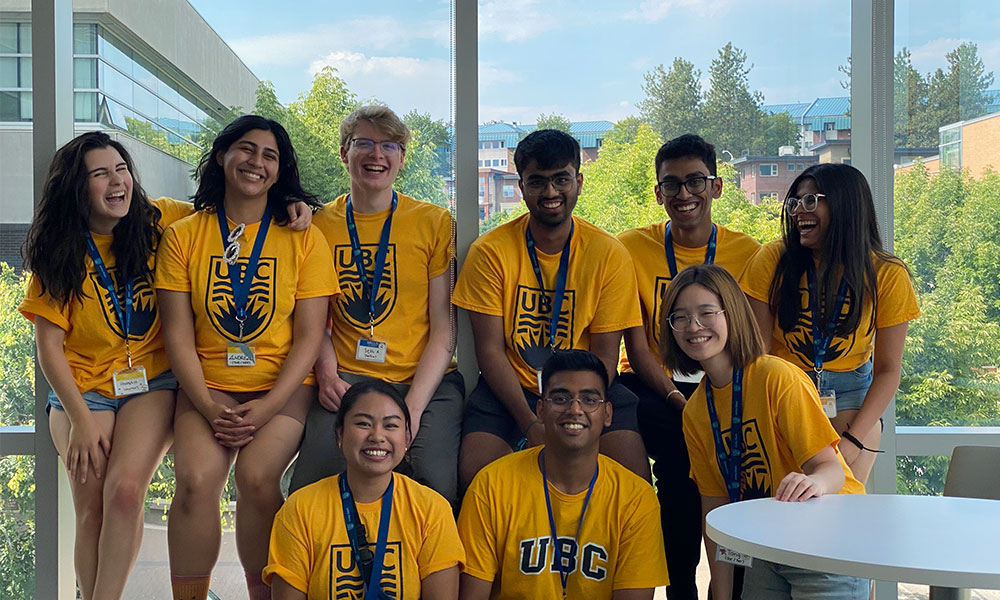
Insha Hooda (far right, back) and her fellow orientation leaders for UBC Okanagan’s Jump Start and Create student orientation programs.
What are some challenges you’ve faced so far in your academic career?
I think my biggest challenge was almost not being able to attend university because of financial constraints. My family was confident we could secure an educational loan based on my acceptance to one of Canada’s highest-ranked universities and my stellar academic record. But patriarchy is still deep-rooted in my homeland, and receiving a university education—which was supposed to be my reality—soon became a slowly fading dream. While I ultimately succeeded in coming to UBCO, this experience taught me that perseverance and hard work are always rewarded; if you set your mind to something, no obstacle can prevent you from reaching your goals.
After my first year of study, I received the Deputy Vice-Chancellor Scholarship for International Students, the UBC Okanagan Management Student Association Scholarship and the Faculty of Management’s International Student Award. These experiences have helped me understand a broader narrative about people and the world. While one cannot control circumstances that life throws at you, the factor differentiating you is how you deal with it; you either become a victim of the problem or surpass others by dealing with it.
What do you think makes UBC Okanagan unique?
UBC Okanagan, which I call my home away from home, has a strong sense of community among students, faculty and staff. This is achieved through a variety of clubs, organizations and events that provide opportunities for students to get involved and connect with others. The university is also committed to fostering a diverse and inclusive community, with a significant number of both international students and opportunities to study abroad. The campus offers a unique combination of natural beauty, small class sizes, research opportunities, a strong sense of community, international focus and an interdisciplinary approach—all of which make it stand out from other universities.
Do you have a mentor? If so, how have they influenced you?
My mother, Hamida Hooda, is my biggest role model and mentor. My strong determination and perseverance are something I learned from my mother, who has been a constant source of encouragement to break stereotypes related to education in my home country of India. She has instilled in me the importance of perseverance, hard work and education, but has always emphasized overall development rather than focusing only on academics. This has helped me develop a variety of life skills and become a more empathetic and humbler individual.
The post Insha Zameer Hooda didn’t let challenges stop her from going to university abroad appeared first on UBC Okanagan News.
What is your research focus, and why did you choose this area of study?
As a master’s student majoring in mathematics, I’m currently conducting interdisciplinary research on the intersection of machine learning and operations management. My research focuses on the applications of machine learning in service systems; particularly how textual data can be used to accurately predict customer wait times in service companies, or to improve scheduling appointments for telemedicine patients in health-care systems.
My work is driven my desire to enhance decision-making. My interest in this area stems from my curiosity about how machine learning can effectively enable service systems—and ultimately people—to make better decisions. What inspires me about this work is the potential consequences of my research on real-world problems facing both customers and business owners. In particular, our health and service systems.
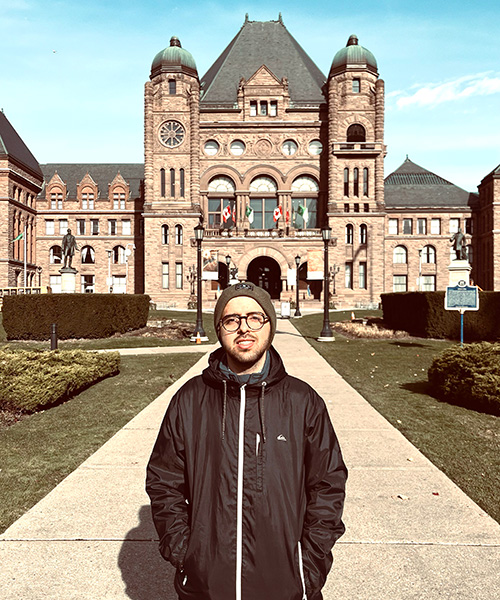
Mohammad Mosaffa.
Why is your research relevant in today’s day and age?
Using statistical approaches to devise methods to improve performance through enhancing decision-making has potential for every industry. For instance, customer service is one of several industries moving online with the rise of digitization. In this space consumers achieving prompt and effective service depends heavily on accurate wait times to achieve consumer’s expectations. My research presents an innovative strategy, which will enhance wait time estimates by combining deep learning and text mining approaches to help boost customer satisfaction and loyalty. The findings could be applied for organizations in a range of sectors, including health care and e-commerce.
What’s the best advice you have for other students?
Throughout my time in higher education, I’ve become aware of the value of effort and a drive to learn. No matter your academic standing, my best advice to other students is to never stop exploring new opportunities and taking chances.
Remember, failure should not be feared. It’s an essential step in the learning process. If we never make mistakes, we might never really understand how far we can push ourselves. To this end, I urge students to take on difficult challenges. Also, seek out a mentor or a supportive group to help you. Having a mentor with expertise in your industry can help you advance your academic and professional goals through priceless counsel and connection.
I also want to stress the value of curiosity and passion. The decision to pursue higher education can be difficult and time-consuming, so it’s crucial to pick a subject that you’re passionate about. When you’re interested in what you’re learning, the task becomes less of a chore and more of an enjoyable exploration of new ideas.
“Having benefited from mentorship myself, I’m committed to effectively training students and hope to positively influence the next generation.”
Who is your mentor and how have they influenced you?
My current mentors, Dr. Amir Ardestani-Jaafari and Dr. Javad Tavakoli, have profoundly shaped my research focus and direction. Under their guidance, I’ve been able to refine my research interests and develop a deeper understanding of the applications of machine learning in operations management. Both men have challenged me to think critically and encouraged me to explore new approaches in my research.
Beyond guiding technical aspects of my research, they have also been supportive mentors in terms of my personal and professional growth. Both professors have been helped me navigate the challenges of research and grow as a researcher. Their expertise, guidance and support have not only helped me achieve my research goals but also inspired me to excellence in my academic and professional pursuits.
What do you hope to do after graduation?
Research is a driving passion for me. Going hand-in-hand with that is my passion for teaching. Having benefited from mentorship myself, I’m committed to effectively training students and hope to positively influence the next generation. My next step is pursuing a doctorate in business with Cornell University, where I hope to achieve my goal of becoming a professor who conducts meaningful research to help improve decision-making.
The post At the intersection of mathematics and business appeared first on UBC Okanagan News.
Why did you choose to study management, with a minor in computer science?
I believe business management studies are always relevant. New businesses are being set up and existing businesses are constantly expanding, especially online. Our increasing reliance on technology also means computer science is essential for students to gain technical skills for programming, human-computer interaction and software engineering. The knowledge I’ve gained from both subjects—including communication, problem solving, teamwork, organization and leadership—has given me a good balance of technical and soft skills that will allow me to excel in the future.
Tell us a little about the management research you were able to conduct as an undergraduate student.
In the summer of 2020, I discovered the Work Learn International Undergraduate Research Award (IURA). I wanted more experience in data analysis, and the program was a wonderful opportunity to conduct research and work on projects that an undergraduate student typically wouldn’t be involved with.
Between March 2020 and July 2022, I was a research assistant on a project with Dr. David Walker that looked at whether the audio characteristics of customer voices in service interactions predict whether the customer will mistreat the employee later in the interaction. Since the conclusion of my IURA journey, I continued working as a research assistant for a substantial portion of my undergraduate degree on different aspects of the same project.
As an international student, how did you approach your new campus setting?
When I arrived at UBCO, I wanted to acquire as much Canadian work and volunteer experience as I could. The first step was to explore employment opportunities at UBCO and get involved with student clubs. I’m deeply passionate about the things I choose to get involved with and know I can play a significant role in supporting the community through my work and volunteer experience.
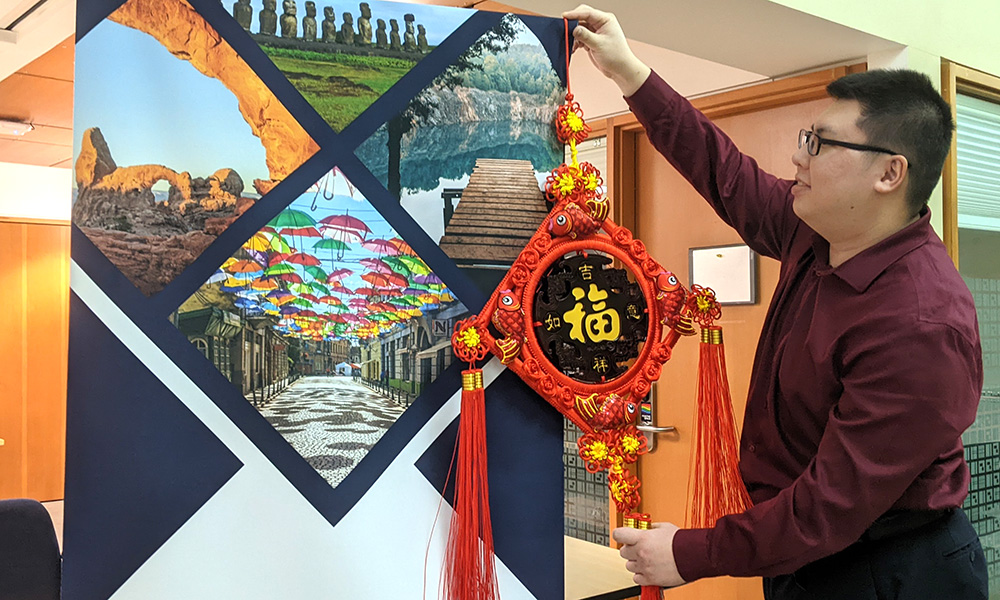
Gabriel Tan decorates for the 2023 Lunar New Year celebrations hosted by UBC Okanagan’s Global Engagement Office.
Why is it important to get involved on campus?
Being involved exposes students to many different experiences and teaches them life skills they may not necessarily learn in the classroom. For me, it was important to get involved with on-campus activities so I could experience how to organize events, give presentations, create budgets and send professional-sounding emails. My on-campus experiences have allowed me to build my problem solving and communication skills, and perhaps more importantly, to learn about my likes and dislikes.
You’re the recipient of an International Community Achievement Award (ICAA), which recognizes international students who contribute to the UBCO campus and community while maintaining an excellent academic standing. What does it mean to you to be an ICAA recipient?
I’m extremely humbled and honoured to be an ICAA recipient. Looking back at the previous winners and their biographies, there have been many students who did amazing work within the UBCO community and beyond, and it’s truly an honour to be recognized as one of a handful of ICAA recipients.
Sometimes it can be difficult for students to balance their studies, work and extra-curriculars, especially if they face financial distress or another disadvantage. I’m thankful I was fortunate enough to be able to find a balance, which allowed me to make a larger impression on the campus community and succeed in my ICAA application.
What do you think makes UBCO unique?
When I first stepped onto UBCO’s campus, I was in awe of the diversity of the student population and the considerable number of nationalities represented. I knew UBCO has an extraordinary reputation among Canadian universities, but I didn’t realize how popular it was among international students as well.
UBCO is also a smaller university, making it much easier for students to connect with one another and their professors on a deeper level. The campus has a highly favourable student-to-faculty ratio, meaning professors are more accessible and students can engage with them more easily.
What’s the best advice you have for fellow undergraduate students?
Explore your interests and actively participate in student clubs and associations, or pursue employment opportunities. University isn’t just about getting good grades; it’s also about learning new skills for future careers and building resumes, so you can one day achieve your dream job.
I recommend connecting with the UBCO Career Development team to know about upcoming networking events and explore your interests. Also consider joining the UBCO Co-op program, as it provides practical job experience while getting paid, and is a potential stepping stone toward a future career.
The post Gabriel Tan believes university is about more than getting good grades appeared first on UBC Okanagan News.
ALLISHA HEIDT WANTS TO REASSURE UBC OKANAGAN’S ENTREPRENEURS that it’s okay to feel lost sometimes. The owner of Kelowna’s Chickpeace Zero Waste Refillery also wants hopeful business owners to know that following your heart and your instincts can produce incredible results.
Heidt graduated from UBC Okanagan with a Master of Arts degree focusing on sustainable communities, and recently joined entrepreneurship@UBCO’s Mentor 2 Market program. She will mentor students on how to incorporate sustainability into their business practices, as well as share with them stories from her successful career as an entrepreneur.
“It’s such a dream to be able to give back in that capacity and to hopefully influence and create even more of a ripple of change through these young graduates. They’re so fiery and excited to have a sustainability-based business,” Heidt says. “Even if they’re not doing something green off the bat, they’re figuring out a way to make it more sustainable.”
Mentor 2 Market is an innovative, collaborative and interdisciplinary mentorship program within UBCO. Its mission is to help students, staff, faculty and alumni in their journey to start a business by connecting them to tools, customers, funding and community. The program is also designed to allow for long-term residency that is individualized and milestone-based to provide continued support to entrepreneurs. This is offered through tandem mentoring, two mentors for each business, from business leaders like Heidt. Mentor 2 Market builds off and compliments the five-part eDiscovery workshop series in partnership with Accelerate Okanagan.
Heidt said she agreed to get involved when UBCO first approached her to join Mentor 2 Market. Working with those on the Kelowna-based campus again is one way Heidt can pay it forward.
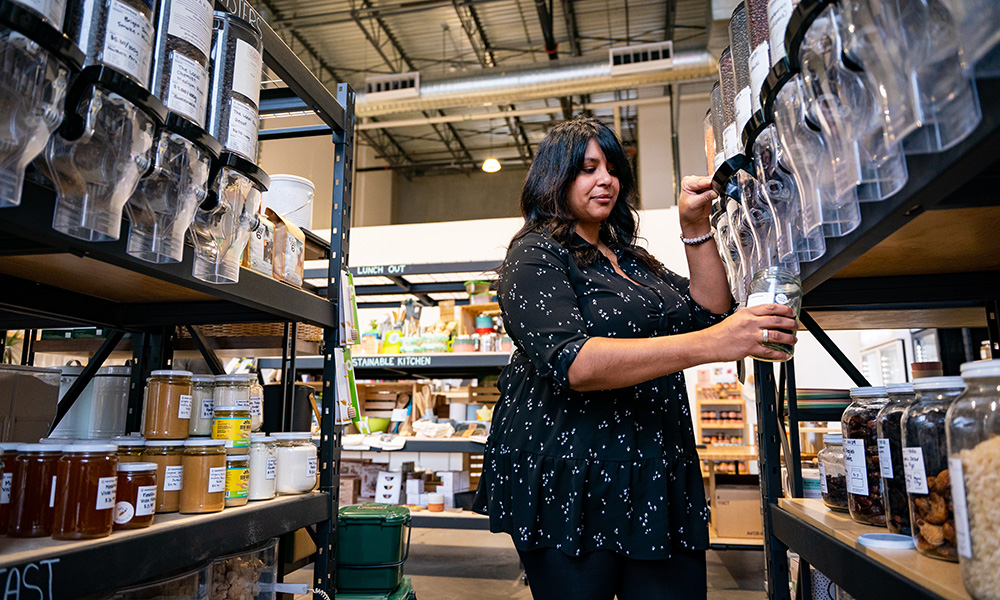
“I’ve heard a few pitches already from students. Even if their business isn’t about sustainability, they want to be so green on the back end. It’s very humbling to be invited to be part of their journey,” Heidt says. “It’s full circle for me because I know what it’s like to be in that position, with all these ideas and not exactly sure what’s happening.”
Heidt admits to having those same feelings when she began her career. She would even admit she took some leaps before then while completing her master’s degree. When she began contemplating post-graduate work there was no such thing as a sustainability degree. But Heidt was able to select courses across disciplines to forge her master’s because even a decade ago, the concept of sustainability was just beginning to move from theory into practice.
Heidt said UBCO’s faculty and staff embraced the challenge of being among the first to offer such an education.
“My experience was unique,” she says. “I didn’t have any roadblocks. It was all very fluid and supportive. I think because the people that I was working with, those who were on my committee, they all believed in the future of sustainability and growing sustainable communities.”
Her first foray into the business world came with GreenStep Solutions, an environmental consulting company based in Kelowna. She then launched MotherLove Kombucha with a business partner, only just recently selling her stake as she branched out again to create Chickpeace.
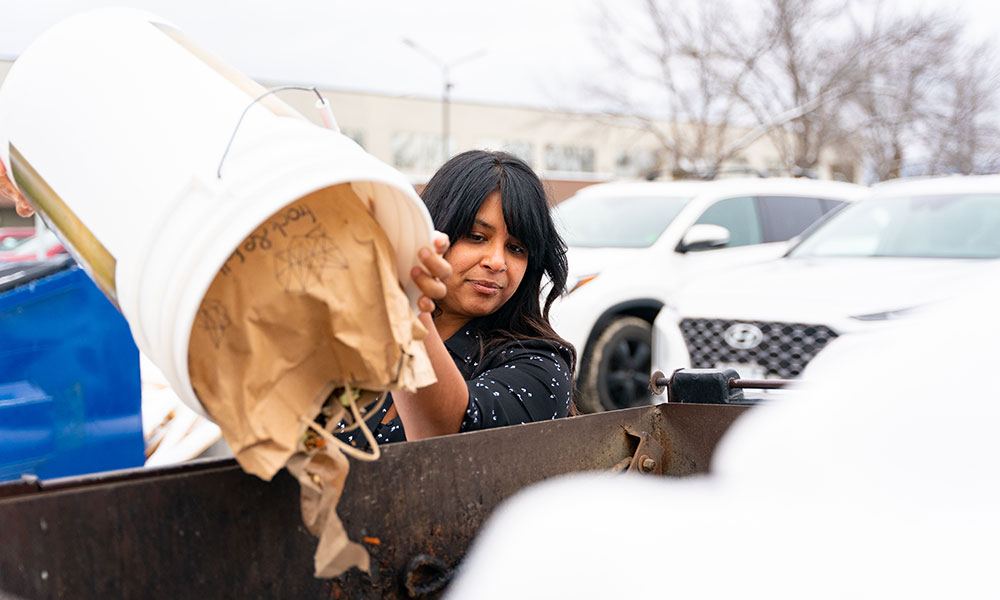
The Refillery’s compost drop-off program aims to make composting easier for customers.
Heidt said she envisioned Chickpeace as something of a lifestyle hub for people who want to do better for the planet. The refillery is more than a business that sells zero-waste, sustainable household products; it also sells beauty and lifestyle products, small groceries, and collects compost. The composting program gives apartment dwellers or those without space to compost a depot to drop their organic waste. It started with one 200-litre bin, quickly expanded to four 200-litre bins and now requires a three-cubic-yard dumpster.
“I knew that I just wanted to have a meaningful business. I knew the planet needed businesses that had a social purpose in mind,” Heidt says. “There were few places in Kelowna where you could shop with your values in mind. It has been so exciting. I think we have grown in ways I did not expect us to grow. We get so many people coming in every single day. Thousands of pounds of compost have been diverted because of our program.”
Heidt knows it’s making a difference, and now she is hopeful her enthusiasm for sustainable businesses—not just refilleries, but all businesses—filters down to the next generation of graduates just the way UBCO supported her.
“I didn’t know the word ‘sustainability’ at that time,” she said. “I just knew when I came back and I wanted to focus my post-graduate work on helping to save the planet.”
The post UBC Okanagan seeds sustainability into entrepreneurship appeared first on UBC Okanagan News.
IF THERE’S ONE THING SHIVEN VINOD KHERA LEARNED at UBC Okanagan, it’s that anything is possible if your heart and mind are in the right place.
The Faculty of Management graduate was part of a team that launched tech start-up Linkbase Technologies Inc. through UBCO’s innovative Mentor 2 Market program, which helps build successful businesses by connecting students with mentors and giving them access to tools, customers, funding and community. Khera says the relationships he and the Linkbase team built on the Kelowna campus through the program were vital to their successes.
“UBCO encouraged us to continually work on our passions,” Khera says. “The professors encouraged us to push ourselves and strive for more. It became clear we could do it.”
Linkbase is an internet of things (IoT) firm that helps small- and medium-sized businesses develop smart products and automate services or processes. It allows users to streamline sometimes time-consuming or wasteful tasks. A hotel owner, for example, could automate checkout using Linkbase’s technology. With the push of a button, curtains in an empty room could close, lights could be turned off, door codes could be changed and climate controls adjusted—all customizable based on what IoT devices are in play.
Khera and his business partners received hands-on help from Mentor 2 Market; in addition to one-on-one mentoring with business leaders, the program offers a five-part eDiscovery workshop series, special information sessions on topics such as funding, intellectual property and company structure, as well as the popular Quick Pitch competition.
“The entire e@UBCO team works tirelessly for students and has a very welcoming and informative program that helps anyone wanting to take their idea to the next level,” Khera says.
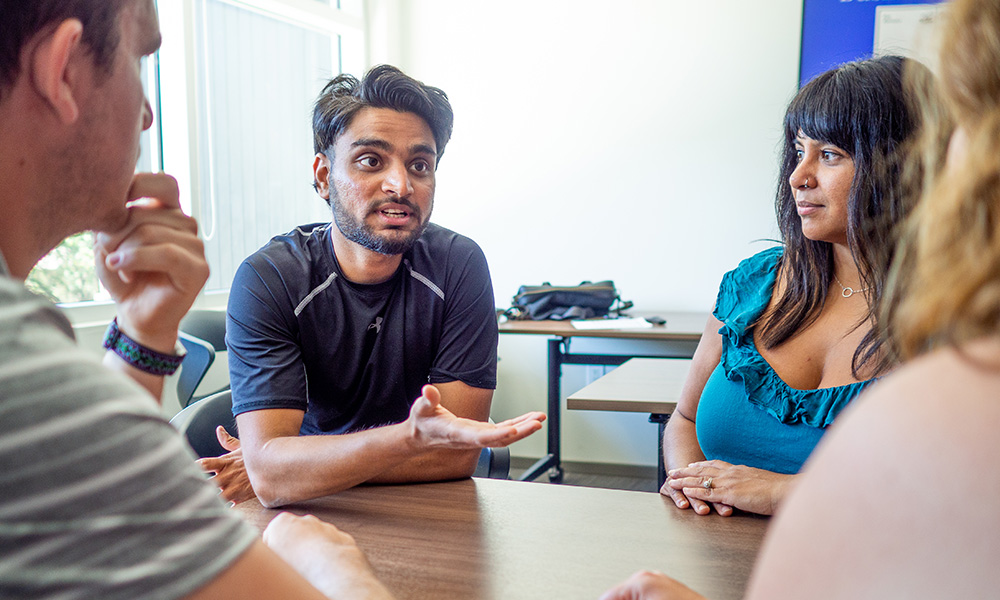
It was during the Quick Pitch Competition—where students get facetime with investors—that everything started clicking for Linkbase. Not only did angel investors give it an initial $5.6-million valuation, but Khera and Co. won the $7,500 first-place prize in 2022. The company’s IoT platform is already supporting 100,000-plus devices, and much of the launch process was aided by Mentor 2 Market. And it’s not just in the interests of profit.
Khera says he gained a greater appreciation for the world around him by attending UBCO and meeting people from across the globe. It became imperative to him that Linkbase offer something for the greater good.
“The company could help save millions in energy costs, thereby reducing an industry’s greenhouse gas emissions. It could help save millions in water waste or streamline agricultural processes to keep food costs in check,” he explains.
That idea, he says, germinated during his first year at school. Khera says students felt empowered immediately to take ownership of their educational journeys with the support of faculty, staff and mentors.
“I was the co-chair of the entrepreneurship club at UBCO and we created a safe space for other students who wanted to start something, or had ideas, to do so,” he adds. “The idea was to create an encouraging environment and for students to be able to meet one another. That environment we created for students to share ideas, be okay to fail and encourage everyone was our safe space.”
It was that spark that resonated with Khera. UBCO gave students permission to extend themselves and their missions, to excel and reach for their goals. Not only did Khera help launch a successful business alongside his colleagues, but he matured into a global citizen at UBCO.
“If you could introduce me to the Shiven of four years ago, I wouldn’t recognize him,” Khera said. “I was shy, I was quiet. But meeting people on campus from all over the world brought me a new confidence. It’s an exciting time as I look ahead, and I know I will carry a piece of UBCO everywhere I go because this place transformed me into my present self.”
The post entrepreneurship@UBCO Mentor 2 Market supporting graduates appeared first on UBC Okanagan News.
The post UBCO Downtown appeared first on UBC Okanagan News.
GROWING UP IN THE SMALL ARGENTINIAN CITY OF RIO CUARTO, Maria Paz Marengo has had a passion for fashion for as long as she can remember.
“I’ve always loved it,” shares the fourth-year Bachelor of Management student. “The city I’m from is small—about twice the size of Kelowna—but everyone there looks really put together all the time. I used to binge watch all the red carpet shows like the Oscars and the Grammys just to see the fashion. I couldn’t care less about the award ceremony itself,” she laughs.
As Marengo’s understanding of the luxury fashion industry grew, so did her curiosity about its strange, almost illogical appeal. “What first caught my eye was the beauty of it, but I soon began to wonder why people buy it. Why would you spend an extra $500 on an item you can get from a fast fashion retailer? What’s the intention of the buyer?”
It was with an eye to exploring a career in marketing and consumer research for the luxury fashion industry that Marengo arrived at UBC Okanagan. “Growing up where I did, everyone knows each other, which is why I chose UBCO,” she says. “Kelowna has a small-town feel. I didn’t want to go straight into a big city.”
“I remember moving out in my first year, and I saw people throwing out their clothes. That was a shock. In Argentina, we don’t throw out our stuff, even if it’s cheap. If we couldn’t wear it again, we would either donate it or cut it up for rags. I’ve never thrown anything out.”
Awakening to fashion waste
While Marengo easily adapted to life in the Okanagan, one thing took her by surprise. “I remember moving out in my first year, and I saw people throwing out their clothes. That was a shock,” she says. “In Argentina, we don’t throw out our stuff, even if it’s cheap. If we couldn’t wear it again, we would either donate it or cut it up for rags. I’ve never thrown anything out.”
That was the beginning of Marengo’s awareness around waste and sustainability in the fashion industry. When she landed in Dr. Annamma Joy’s course on brands, culture and marketing, Marengo was thrilled to discover her passions were starting to intersect. “I looked at the syllabus and noticed that one of our projects was all about luxury brands. I thought, ‘Okay, I’m really excited!’”
Hoping to do research during her last summer as an undergraduate student, Marengo reached out to Dr. Joy. The management professor, who is writing a book on the future of luxury brands and sustainability, suggested Marengo apply for an International Undergraduate Research Award for a project tied to that topic. When the award was approved Marengo dived right in, first examining her own purchasing decisions, and then exploring circularity—the entire life cycle of the product—in the luxury market.
Reflecting on the Sustainability and Business (MGMT 380) course she took as part of the Bachelor of Management program, Marengo points out that sustainability is no longer optional in business. “That course taught me that sustainability is not just about greenwashing or just about being ethical. If you want to succeed in the long-term, you have to be sustainable,” she says. “The investment in sustainable initiatives actually ends up paying for itself. That was a big realization for me—that it’s not that you have to be ethical and environmentally friendly for the sake of it. There’s profit in this. This is the future; this is business.”
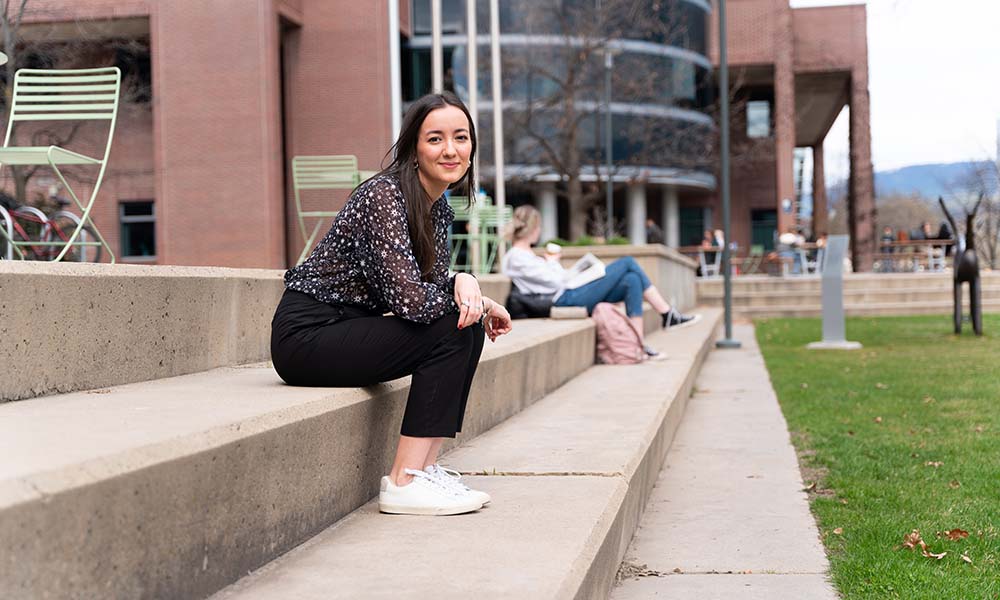
Bachelor of Management student Maria Paz Marengo.
Designing a more sustainable future
Today, Marengo says the research skills she learned over the summer are being put to good use in the final, research-intensive year of her undergraduate studies. “I feel like I know where to look for information now, and how to find reputable sources that are useful,” she says. “I don’t lose time by looking at information that isn’t usable.”
Her summer experience has also changed her perspective on the world, and how she interacts with the planet. “I used to be someone that was like, ‘Yeah, I care about sustainability.’ Obviously, I believe in climate change. I believe that we have to change something to save the planet. But when I started looking at what I bought, the only thing I was concerned with was whether it was sweatshop-free. I wasn’t considering the environmental aspect of sustainability.”
These days, Marengo is making more conscious decisions to find sustainable alternatives to the fast fashion she’s used to purchasing, and actively seeks out brands whose business model is rooted in sustainability. With graduation on the horizon, Marengo is also more focused than ever on the business of luxury fashion, contemplating a move to the fashion capital of the world, Milan, with the hopes of pursuing a master’s degree in luxury management.
Working in the luxury fashion business has always been a dream, she says—only now, she has added a passion for sustainability into the mix. “I think a lot of luxury fashion companies are more advanced, in a way, than conventional fast fashion companies, but there’s still a long way to go,” she says. “After this experience, I think that helping integrate more sustainability into the industry is something I could help with.”
The post From Argentina to Milan appeared first on UBC Okanagan News.
